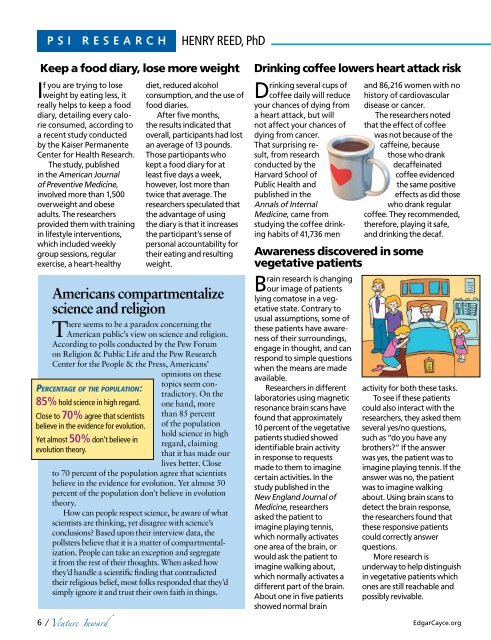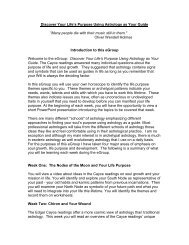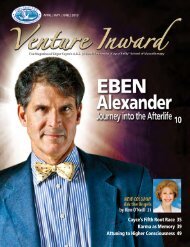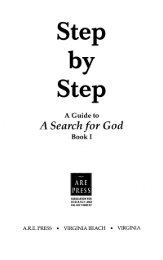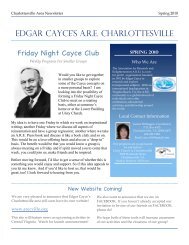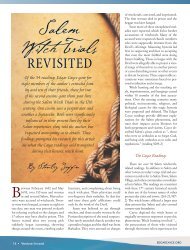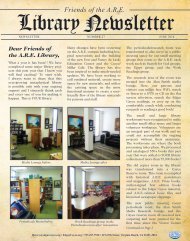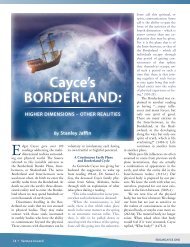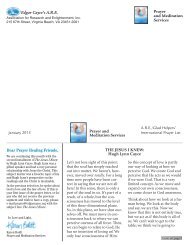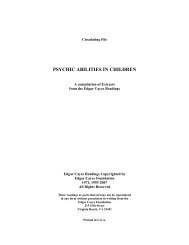new this issue - Edgar Cayce
new this issue - Edgar Cayce
new this issue - Edgar Cayce
You also want an ePaper? Increase the reach of your titles
YUMPU automatically turns print PDFs into web optimized ePapers that Google loves.
P S I r e s e a r c hHENRY REED, PhDKeep a food diary, lose more weightIf you are trying to loseweight by eating less, itreally helps to keep a fooddiary, detailing every calorieconsumed, according toa recent study conductedby the Kaiser PermanenteCenter for Health Research.The study, publishedin the American Journalof Preventive Medicine,involved more than 1,500overweight and obeseadults. The researchersprovided them with trainingin lifestyle interventions,which included weeklygroup sessions, regularexercise, a heart-healthydiet, reduced alcoholconsumption, and the use offood diaries.After five months,the results indicated thatoverall, participants had lostan average of 13 pounds.Those participants whokept a food diary for atleast five days a week,however, lost more thantwice that average. Theresearchers speculated thatthe advantage of usingthe diary is that it increasesthe participant’s sense ofpersonal accountability fortheir eating and resultingweight.Americans compartmentalizescience and religionThere seems to be a paradox concerning theAmerican public’s view on science and religion.According to polls conducted by the Pew Forumon Religion & Public Life and the Pew ResearchCenter for the People & the Press, Americans’opinions on thesetopics seem contradictory.On thePercentage of the population:85% hold science in high regard. one hand, moreClose to 70% agree that scientists than 85 percentbelieve in the evidence for evolution. of the populationhold science in highYet almost 50% don’t believe inregard, claimingevolution theory.that it has made ourlives better. Closeto 70 percent of the population agree that scientistsbelieve in the evidence for evolution. Yet almost 50percent of the population don’t believe in evolutiontheory.How can people respect science, be aware of whatscientists are thinking, yet disagree with science’sconclusions? Based upon their interview data, thepollsters believe that it is a matter of compartmentalization.People can take an exception and segregateit from the rest of their thoughts. When asked howthey’d handle a scientific finding that contradictedtheir religious belief, most folks responded that they’dsimply ignore it and trust their own faith in things.Drinking coffee lowers heart attack riskDrinking several cups ofcoffee daily will reduceyour chances of dying froma heart attack, but willnot affect your chances ofdying from cancer.That surprising result,from researchconducted by theHarvard School ofPublic Health andpublished in theAnnals of InternalMedicine, came fromstudying the coffee drinkinghabits of 41,736 menAwareness discovered in somevegetative patientsBrain research is changingour image of patientslying comatose in a vegetativestate. Contrary tousual assumptions, some ofthese patients have awarenessof their surroundings,engage in thought, and canrespond to simple questionswhen the means are madeavailable.Researchers in differentlaboratories using magneticresonance brain scans havefound that approximately10 percent of the vegetativepatients studied showedidentifiable brain activityin response to requestsmade to them to imaginecertain activities. In thestudy published in theNew England Journal ofMedicine, researchersasked the patient toimagine playing tennis,which normally activatesone area of the brain, orwould ask the patient toimagine walking about,which normally activates adifferent part of the brain.About one in five patientsshowed normal brainand 86,216 women with nohistory of cardiovasculardisease or cancer.The researchers notedthat the effect of coffeewas not because of thecaffeine, becausethose who drankdecaffeinatedcoffee evidencedthe same positiveeffects as did thosewho drank regularcoffee. They recommended,therefore, playing it safe,and drinking the decaf.activity for both these tasks.To see if these patientscould also interact with theresearchers, they asked themseveral yes/no questions,such as “do you have anybrothers?” If the answerwas yes, the patient was toimagine playing tennis. If theanswer was no, the patientwas to imagine walkingabout. Using brain scans todetect the brain response,the researchers found thatthese responsive patientscould correctly answerquestions.More research isunderway to help distinguishin vegetative patients whichones are still reachable andpossibly revivable.6 7 <strong>Edgar</strong><strong>Cayce</strong>.org


